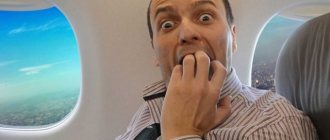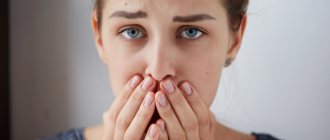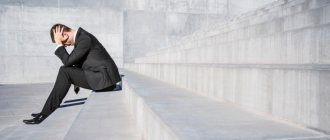Aerophobia is the strongest irrational fear of air travel. Such a seemingly insignificant problem actually brings great discomfort to a person suffering from such a disorder. Some people have to cancel vacations in warm countries, losing money, others refuse lucrative business offers. The result of ignoring such a problem is lost opportunities and pronounced psychological discomfort!
Aerophobia is a mental disorder , and since it is very difficult to get rid of it on your own, do not be afraid to seek professional help! Doctors at the Leto specialized clinic will individually select a course of psychotherapy that will relieve you of unaccountable fear.
Is there a cure for aerophobia?
Yes, aerophobia can be treated like any mental disorder. Doctors of the clinic named after. prof. F.F. Preobrazhensky helped dozens of patients with fear of flying on an airplane. The problem is that most people suffering from aerophobia are quite suspicious and have great difficulty going to see a doctor.
Contact a specialist
Sign up for a consultation tel. 242-82-65
Make an appointment
Leonid Leonidovich Kelin
KMN psychiatrist, narcologist, psychotherapist
A doctor of the highest category has specializations in psychiatry, narcology and psychotherapy
What Causes Fear of Flying: 4 Possible Factors
There are several factors that can increase your fear of flying. It can be caused by one specific cause or a combination of a number of factors.
Thus, aerophobia can develop after a bad flight experience, or when meeting someone who has experienced a traumatic flight incident or aviation event.
Feelings of loss of control are a common trigger for anxiety and a fairly common factor in aerophobia. Knowing that you can't influence the situation or leave the salon whenever you want can be scary for some people.
- Lifestyle Panic attack: symptoms and ways to cope with an attack of severe fear Definition of panic attacks, risk factors and treatment methods.
Claustrophobia is another condition that can trigger aerophobia. An airplane cabin is a confined, crowded space, and it can feel especially cramped during boarding when emotions are already running high.
And finally, fear of heights (acrophobia) when at an altitude of 9-12 kilometers above the ground begins to manifest itself in its worst form.
How is the fear of flying on an airplane treated?
In order to treat aerophobia, you must first understand the characteristics and source of fear in each individual case.
Hereditary predisposition
It is known that children of anxious parents are more susceptible to aerophobia. If a person has a family history of people who constantly see a lot of worries and dangers in the world, then the likelihood of developing aerophobia increases.
Education and childhood
The issue of childhood education is very important. Figuratively speaking, if a child climbs onto a chair, some parents will try to support his courageous act with the words “well, go ahead, jump, I’m with you.” And other parents will attack with shouts of “where did you get off, get off, you’ll fall.” What will happen when these children grow up? In the first case, a person will be able to react normally without prejudice to situations that are unusual for him, for example, flying on an airplane. In the second case, over the years, a person will find himself in a world full of dangers and uncertainty and will easily create a phobia for himself, which he himself will not be able to get rid of.
At the appointment, the doctor will carefully examine the type of aerophobia from which a particular patient suffers. Treatment will be based on this. Experts identify eight main types of aerophobia.
Identification of the type of aerophobia
Fear of flying may be based on:
- hypercontrol (the need for complete control over the situation),
- fear of death (thanatophobia)
- exaggerated fear of heights,
- claustrophobia, fear of closed spaces can form the basis of aerophobia. If a person is afraid to ride in an elevator or subway, then he will bleach and fly on an airplane. And he is not afraid that something will happen to the plane, but he is afraid that something will happen to his health if he cannot get out when he wants.
There are several other types of aerophobia, and the doctor will definitely highlight the nature and source of a person’s fear. And this is already half the success.
Aerophobia: features and clinical manifestations
According to statistics, about 10% of people suffer from this illness, another 15% experience anxiety and internal tension while in the sky. As a rule, aerophobia is diagnosed in young people over 25 years of age (55% women and 45% men). This disorder does not occur in children and adolescents.
It is extremely difficult for aerophobes to travel without strong sedatives. Some people refuse to fly, others feel severe anxiety during the flight, even to the point of panic attacks .
What is noteworthy is that people with aerophobia often add to their fantasies scenes of plane crashes seen in films or news videos. Therefore, panic attacks worsen, and a great fear of death appears, which, by the way, always underlies this disease. Without a doubt, such an instinct is necessary for a person, but only when his life is in real danger. In this case, the fear of death has no compelling reason.
Often young people mistakenly attribute this disorder to themselves, experiencing pre-flight anxiety, which is quite normal for many travelers. In fact, a phobia can only be diagnosed if a number of specific symptoms are observed in a person’s behavior:
- severe anxiety and even irritability while waiting for the day of departure;
- searching for information on how to cure aerophobia or calm down before a flight;
- refusal to use air transport;
- cancellation of plans at the very last moment, even to the point that a person changes his intentions right before boarding;
- obsessive thoughts about the plane crash;
- constant monitoring of air travel-related mortality statistics and news about tragedies that occurred on air flights;
- studying information about the reliability of the aircraft;
- choosing a long train ride when the alternative is a fast route in the air;
- taking large doses of alcohol before check-in or already on board the plane to reduce anxiety;
- taking medications (relaxants/tranquilizers) before the trip.
In addition, already on board an airplane, patients with aerophobia differ from others in their behavior:
- constantly listen to the sounds of the engine, fearing problems;
- have difficulty breathing;
- they monitor the flight attendants’ movements around the cabin and especially their faces, trying to catch at least a hint of anxiety, which may indicate a problem;
- they are afraid and panic even at the slightest turbulence;
- feel a rapid heartbeat throughout the flight and especially at the moment of landing;
- they often ask flight attendants if everything is okay with the plane and what they should do in case of an accident;
- are in constant physical tension, etc.
Finally, after landing, such passengers spend a long time “moving away” from the flight; often the thoughts of returning home by plane spoil the entire impression of the trip.
An integrated approach to the treatment of aerophobia
The treatment is based on psychotherapeutic techniques with a change in orientation and devaluation of fears. Various techniques of conscious and subconscious suggestion are used, with the use of additional relaxation techniques during sessions. Against the background of relaxation, information is placed on a deeper subconscious level. The necessary relaxation is achieved using acupuncture methods and special modern devices that stimulate the production of endorphins in humans.
Treatment for aerophobia usually consists of 10 individual psychotherapeutic sessions. The cost of a course of treatment is 20,000 rubles. Prices for certain types of psychotherapeutic services can be clarified in the section After a course of psychotherapeutic treatment, in agreement with the patient, we conduct special training in real flight conditions on an airplane.
How an aerophobe can prepare for a flight
Regardless of whether you have aerophobia or just a fear of air travel, following our recommendations you can reduce your anxiety level:
- Don't be late for your flight, check in as early as possible to avoid unnecessary stress and worry.
- Think in advance about how to distract yourself from anxious thoughts during the flight: you should download books, movies, and relaxing music to your phone (tablet or laptop).
- Choose a seat on the plane in advance, ideally if it is at the very beginning of the cabin, since the least turbulence is felt in the bow of the plane, and there is much less noise there. Do not sit at the window so as not to look at what is happening overboard.
- Learn to breathe correctly, this is especially important when symptoms of an upcoming panic attack appear. It is necessary to take a deep breath and exhale, counting the number of breathing movements to yourself, controlling their rhythm.
- Under no circumstances should you drink alcohol to calm down, as this leads to the completely opposite effect. The same goes for coffee and other tonic drinks, which increase your heart rate even more. It is better to drink clean drinking water.
Also, try to fall asleep by preparing an eye mask and earplugs in advance. Sometimes you can take a mild sleeping pill (of course, in the absence of contraindications).
Why the clinic named after. prof. F.F. Is Preobrazhensky recommended for the treatment of aerophobia?
- Unique psychotherapists, specialists in the treatment of phobias, authors of many books and articles on this topic, candidates of medical sciences, doctors of the highest category.
- Author's techniques that have shown practical results and are time-tested
- Complete anonymity and confidentiality of treatment
- The clinic has experience since 2000.
- Treatment under contract with guaranteed results.
- Possibility of strengthening the removal of fears during training in real flight conditions on an airplane with a psychotherapist
Come to our clinic and join the many happy people who have conquered their fear of flying.
Make an appointment
Treatment methods
Aerophobia cannot be tolerated, and it is simply impossible to adapt to it. It not only creates discomfort, but, as it gets worse, it will deal blows, each time more significant, to the physical and mental state of a person. Therefore, you need to immediately contact a psychologist.
To treat pathology, pharmacological drugs and corrective psychotherapy are used.
Aerophobia tablets
Is there any effective, effective remedy for fear of flying? Usually sedatives (calming) drugs are prescribed as medications. Each product is selected individually by a specialist. This can be either tablets, valerian drops or motherwort tincture. Anxiolytics are possible - drugs that reduce fear.
If a patient has a problem with the vestibular apparatus (he gets motion sickness), then there are antihistamines that block this process: Aeron, etc.
Self-medication in this case is unacceptable: each drug and its dosage is prescribed only by a doctor. This will avoid negative consequences from side effects and intolerance to components, allergies.
In addition, experts do not recommend taking strong anti-stress medications at all, since they can act unpredictably in flight conditions. Homeopathic, non-addictive ones are recommended as sedatives.
Many aerophobes believe that by taking a quick-acting pill, they will immediately forget about anxiety and can freely set off on an airliner. But this will have to be done every time before boarding. And the problem, in general, will not go away, but will continue to haunt you for the rest of your life!
The “magic pill” cannot get rid of fear. It will only relieve his symptoms for a while. But the aerophobe’s brain will remember that it was necessary to suppress the frightening situation with the help of a drug that made it possible to endure a “dangerous, very scary, risky” flight.
The body still suffered stress, which will increase during the subsequent flight. And one “beautiful” day, no remedy will cope with fear. That is why the intervention of a specialist is necessary to help the patient find the causes of the phobia and change his thinking to a positive one.
Help from a psychologist
First of all, the patient needs to admit that there is a problem - without this, aerophobia cannot be cured. Next, a psychologist comes into the work, looking for the source of irrational fear and teaching him to relax, using the following techniques:
- cognitive behavioral therapy;
- exposure technique;
- hypnosis.
An experienced specialist in Moscow can be found at the City Psychoendocrinological Center. When he works together with a patient who is aware of his disorder and wants to be cured, it will not take much time to get rid of aerophobia - a few short sessions are enough.
Now in different countries there are Centers to combat aerophobia (in Russia there are also such). People of all ages come to them. There, among other methods, a flight stimulator is used - a full-size copy of a real aircraft.
Clients study the equipment, sit at the controls themselves, simulating takeoff and landing in certain weather conditions and time of day. This gives them the opportunity to fully understand what is happening on board, why the sounds occur that frighten them so much, and why the plane shakes in the turbulence zone, and learn about many standard situations that are completely harmless. All this gives an excellent therapeutic effect.
What not to do?
Airlines, psychologists, and crew unanimously prohibit:
- drink alcohol before the flight in any quantity. Firstly, it will not save you from anxiety. Secondly, it can lead to violent behavior during the flight. Thirdly, they may simply not be allowed on the plane;
- exclude uncontrolled use of any medications. Firstly, you may be mistaken for drunk and not allowed on board. Secondly, the body under the influence of medications may not respond to a change of environment in the best way;
- smoke more than one cigarette every 30 minutes. Increased blood pressure will have a bad effect on the body at altitude;
- read disaster statistics before flying. Such reading is harmful, since it will not help get rid of fear, but will only create even more uncertainty.
Classification
Experts divide aerophobia into two periods:
- Pre is the period before a flight when a few days or hours before a flight a person develops nervousness. In this case, the patient can be either aggressive and irritable, or withdrawn and depressed. Immediately before the flight, he can do everything to ultimately avoid boarding the plane.
- The period in flight - after boarding the aircraft, a number of characteristic symptoms develop: heart rate and pressure increase, tremors , sweating , and gastrointestinal dysfunction are noted. A person “increases” his condition by analyzing the flight and the actions of the crew, imagining disasters. Moreover, any deviations from the norm during the flight can provoke a panic attack .
Diet
Diet for the nervous system
- Efficacy: therapeutic effect after 2 months
- Timing: constantly
- Cost of food: 1700-1800 rubles per week
Before the flight, it is recommended to eat lightly, since problems with the vestibular system are more likely to appear on an empty stomach. It is recommended to eat light, familiar food, without overusing fried and fatty foods.
It is better to drink herbal or green tea. You should avoid coffee and alcohol, as these drinks increase your heart rate.
Main symptoms
The most common symptoms that people with fear of flying notice in themselves:
- The heartbeat quickens at the mere thought of the upcoming journey by air. Some people’s hearts skip a beat, even if the flight is only in a month;
- the desire to use the usual sedative, alcohol, smoke a cigarette, or use other attempts to calm down;
- dizziness accompanying tachycardia. Particularly impressionable people may even faint;
- due to the fear of flying, sweating increases: wet palms and armpits are faithful companions of those who are familiar with aerophobia;
- the body is in constant tension: endless audio (and if the window allows, then visual) control of the engine, convulsive reactions to any shaking, inability to sleep or simply switch attention;
- suspicion towards the crew: attempts to hear alcohol intoxication in the pilot’s voice, to read the terrible thoughts of the flight attendant, which she allegedly hides behind a smile;
- the turbulence zone, when the liner begins to shake, causes uncontrollable manifestations of phobia and the most terrible thoughts of death.
Causes
A person with aerophobia tells himself “I’m afraid to fly” for certain reasons. The development of this condition is provoked by both external and internal factors.
External factors contributing to the development of such a phobia are:
- Lack of delivery information on flight safety.
- The influence on people of images of plane crashes seen in the news.
- My own experience of a “difficult” flight, when technical difficulties arise, bad weather conditions are observed, etc.
- Impressions from stories from relatives or friends about problems in flights.
Internal factors that increase the likelihood of developing such a phobia are:
- Physical and mental exhaustion or overwork.
- Somatic diseases: cardiovascular diseases, increased susceptibility to sudden changes in pressure.
- Depressive state, neuroses , reducing resistance to stress.
In airplane
If you are already sitting on the plane, then half the work is done and you can be proud of yourself. But you feel yourself starting to panic. These few steps will help you manage your anxiety.
- Try to relax,
take a comfortable position, put on a sleep band, turn on calm music. Breathing always helps to calm down: inhale (half as long as exhale), you can breathe counting and as slowly as possible. By concentrating on this process, you will not notice how the unpleasant sensations will leave you. If the sounds of turbines scare you, use headphones. - Talk to a fellow passenger
or walk around the plane. - Prepare yourself for the pleasant things that await you:
imagine how happy you will be when you see your friends or visit new places, try new food, meet your family. - Use mobile apps
for aerophobes, such as Skyguru. It works in airplane mode and tells you in detail what is happening during the flight. The passenger receives information about when to expect turbulence and whether to be afraid of shaking on board. During the flight, the application “talks” to the user, so you have a feeling of security, a constant connection with a psychotherapist, albeit a virtual one. - The sooner you realize
that you are experiencing panic, the sooner you can cope with it. By ignoring your emotions, you only make the situation worse. Accept your anxiety.









